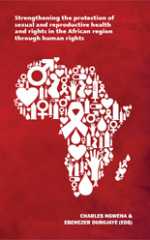Strengthening the protection of sexual and reproductive health and rights in the African region through human rights

Strengthening the protection of sexual and reproductive health and rights in the African region through human rights
Edited by Charles Ngwena and Ebenezer Durojaye
2014
ISSN: 978-1-920538-31-6
Pages: 355
Print version: Available
Electronic version: Free PDF available
| File Size: | 2.05 MB |
| File Type: | application/pdf |
| Hits: | 14040 Hits |